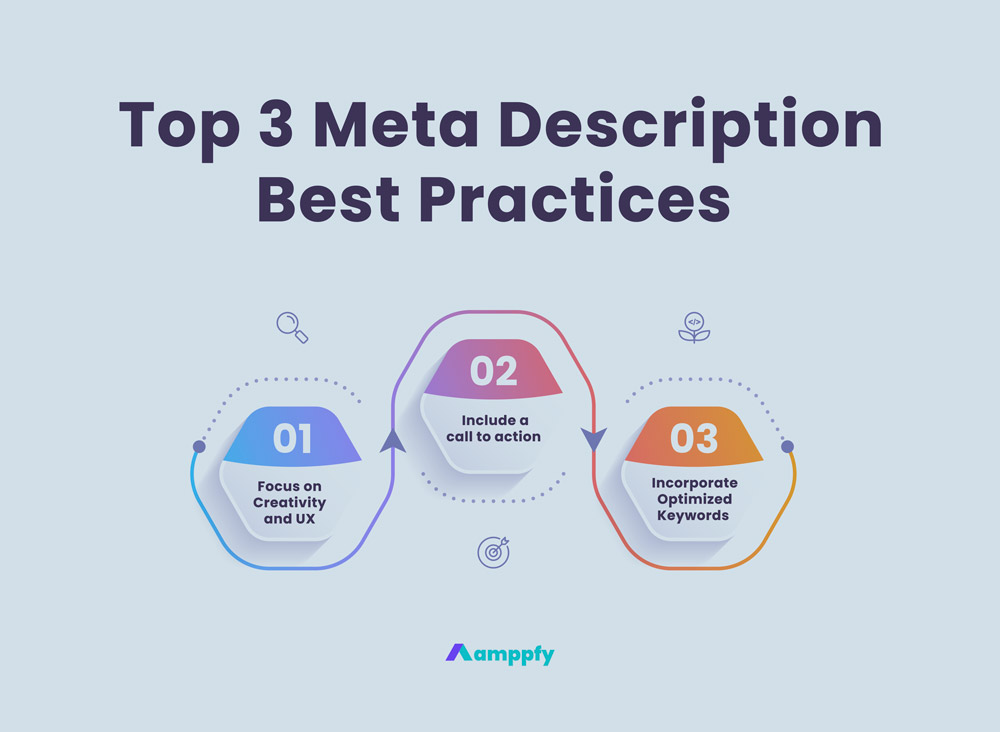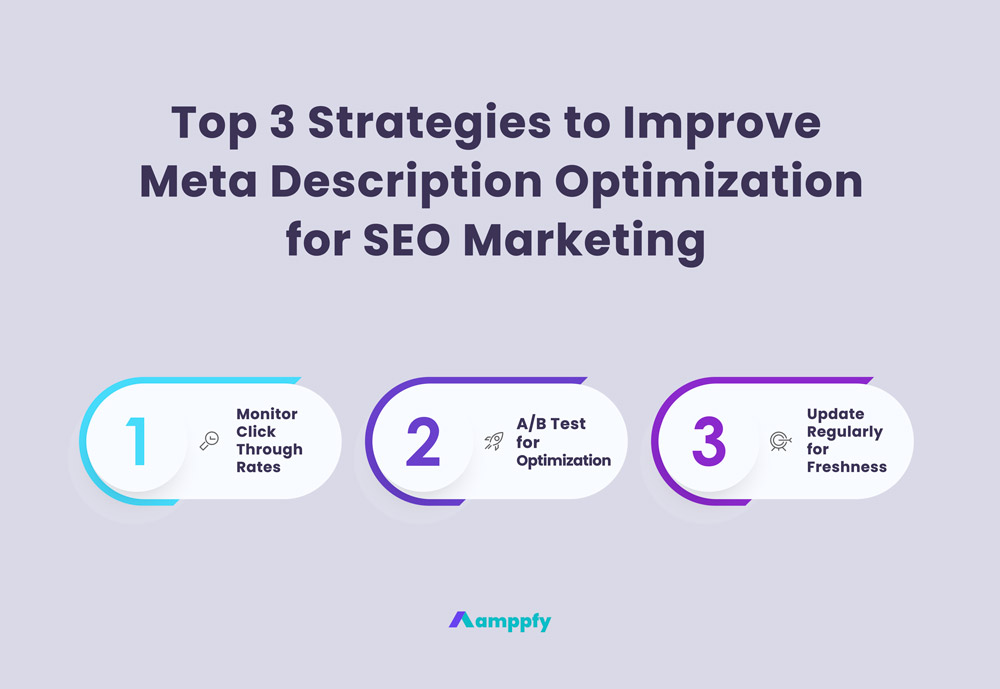Share via:

-
Save
A meta description is critical to the performance of SEO marketing. In short, it is the text within a meta tag describing a specific webpage, such as a product page or a blog post. We will dive into the best practices for writing compelling meta descriptions to get your webpages to rank in organic search.
What is a Meta Tag?
Meta tags are HTML codes within the landing pages that describe the content of a particular page. They reside in the <head> section of a webpage.
What is a Meta Description?
A meta description is an HTML attribute that summarizes the content on a landing page (SEO-R3D1) for search engines and potential visitors. These brief snippets are usually displayed under the clickable title link on Google’s search engine result page (SERP). The meta description helps describe what content visitors can expect when clicking through a webpage.

-
Save
Why is the Meta Description Important?
The meta description is critical to on-page SEO marketing (SEO-R1D1), providing a concise and informative summary of a webpage’s content. The meta description should give a brief, straightforward, and accurate narrative of what a webpage is about while incorporating relevant keywords to match what your customers are actively searching for.
Try the Free SEO Meta Description Generator
- 100% Free
- No Account Required
- Available 24/7
Do Meta Descriptions Affect Organic Keyword Ranking?
While meta descriptions do not directly impact organic keyword rankings (SEO-R4D1) in Google or Microsoft Bing searches, they can significantly impact click-through rates and overall search ranking based on the meta description content. Therefore, it is imperative to craft effective meta descriptions that accurately reflect the webpage content to increase the click-through rate to your site through an attention grabber like a benefit statement or a call to action.
Will Google Use the Meta Descriptions I’ve Written?
There is no guarantee Google will use the meta descriptions you have written for the landing pages. Depending on what the visitor searches for, Google will either select the meta description you have written or auto-generate a description from the content that best answers the potential customer’s questions or solves their pain points. However, you will increase the chances of better SEO performance (SEO-R1D2) by having a proper meta description for every webpage.
Recommended Meta Description Character Limit
Keep meta descriptions short and to the point, and the recommended meta description length is within 155 characters. Depending on the pixel width of each character, if the meta description length goes beyond 155 to a maximum of 160 characters, Google will truncate the description. Meta description after 160 characters will be cut off with “…”
Example of How the Meta Description Looks in HTML
The following is an example of how a meta description in HTML will display in a webpage’s <head> section.
<meta name="description" content="Awesome Description Here, try to use 155 characters or less">
How to Write a Good Meta Description for SEO Content Marketing
A good meta description gives visitors a brief overview of a landing page. A well-written meta description snippet improves the click-through rate of a webpage and piques visitor interest, improving the opportunity to convert a potential search into a visitor.
Top 3 Meta Description Best Practices

-
Save
- Make the meta description stand out by focusing on creativity and user experience.
- Include a call-to-action in the meta description that intrigues visitors to click and find out more.
- Improve SEO efforts by incorporating optimized keywords in the meta description.
Avoid Writing Duplicate Content for Meta Descriptions
One of the most critical aspects of meta description optimization is to avoid writing duplicate content. Having the same meta description on multiple pages of a website confuses visitors and search engines. Duplicate meta descriptions make it challenging for Google to differentiate between webpages. Creating unique and relevant meta descriptions for each webpage helps search engines better understand the content and improves the website’s overall search visibility.
Meta Descriptions Should Stay Relevant to the Webpage Content
Make sure your meta descriptions accurately reflect the content of each page on your website. Relevant meta descriptions that match the webpage’s overall content help manage user expectations and reduce bounce rate (a visitor leaving a page without taking any action.)
When visitors click through a search result and find that the content does not match the meta description, they are likely to leave the page immediately, resulting in a higher bounce rate. Also, avoid misleading or inaccurate meta descriptions to steer clear of negative user experiences that adversely impact your website’s overall brand reputation. Focus on creating concise, relevant meta descriptions that correctly describe each webpage’s content.
Top 3 Strategies to Improve Meta Description Optimization for SEO Marketing

-
Save
Strategy 1: Monitor Click-Through Rates on Google Search Console
Keeping an eye on your keywords’ click-through rates (SEO-R4D2) helps to identify areas for improvement. You can find data on click-through rates in your Google Search Console. Low click-through rates could indicate that the meta descriptions may not be relevant or engaging enough for visitors on a specific page. Periodically optimize or re-work your meta descriptions for better results, and monitor any inconsistency.
Strategy 2: A/B Test for Optimization
A/B testing different versions of meta descriptions and analyzing keyword click-through rates can help identify which marketing messages resonate most with visitors and drive more traffic to your website.
Strategy 3: Update Meta Descriptions for Freshness
Ensure your meta descriptions remain up-to-date and relevant for visitors and customers. As your business goals evolve and marketing content refreshes (SEO-R3D2), take the time to update your meta descriptions to reflect the most recent changes on your website accurately. For example, revisit your existing meta descriptions as you launch new products, make updates to the brand, promote new marketing campaigns, or create new marketing messaging.
Meta Descriptions are a Critical SEO Marketing Component
Leverage meta descriptions to help your website stand out in search engine result pages. It is essential to focus on crafting engaging, informative, and relevant meta descriptions along with compelling meta titles (SEO-R1D3) while consistently testing them for effectiveness and making regular updates to drive more traffic to your website.
Try the Free SEO Meta Title Generator
- 100% Free
- No Account Required
- Available 24/7
Continue the Learning Journey with Amppfy
Amppfy’s digital marketing resource library is beginner-friendly, and zero technical or marketing experience is required to get started. Learn how to create a practical, actionable, and programmatic digital marketing playbook for any business website, e-commerce store, or content platform. Leverage effective SEO, SEM, and social media strategies to boost brand authority, increase online visibility, and generate quality demand.
Follow us on LinkedIn, Facebook, Instagram, and YouTube to stay updated on the latest marketing news, strategies, and free content.
Get Started with Free Generative AI Marketing Tools
- 100% Free
- No Account Required
- Available 24/7
Share via:





